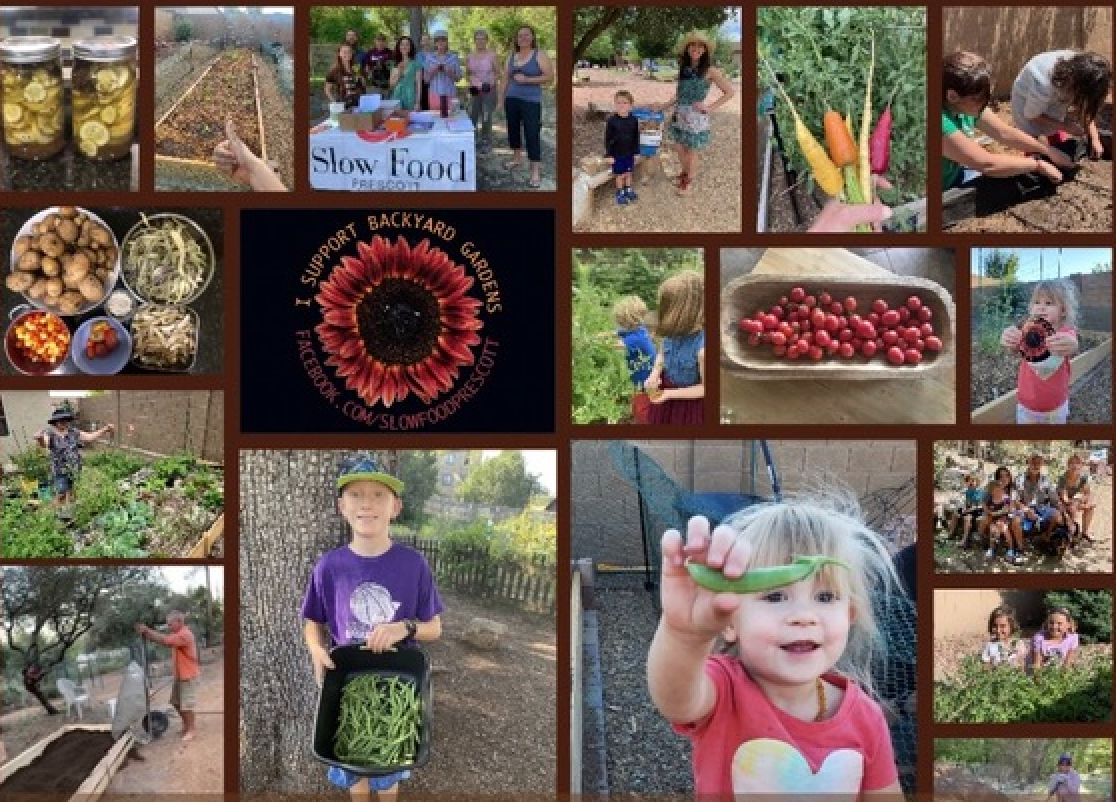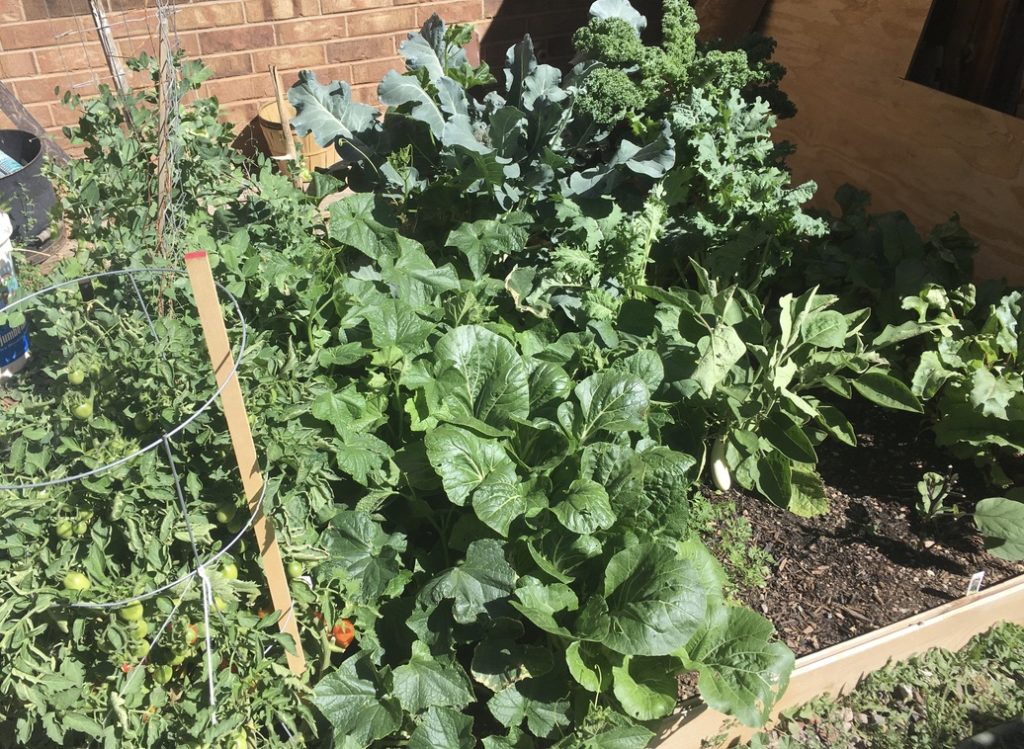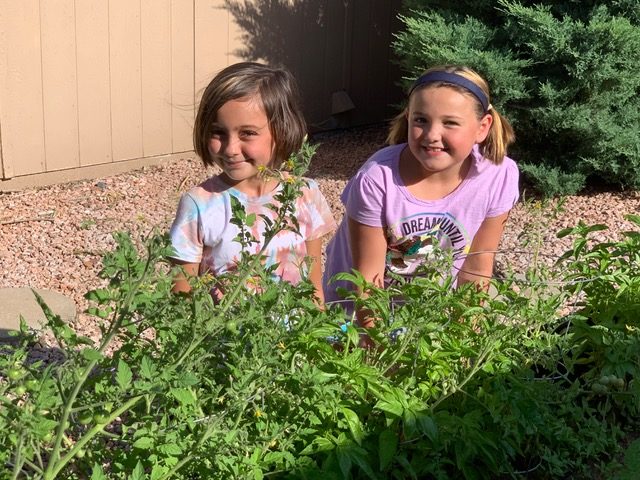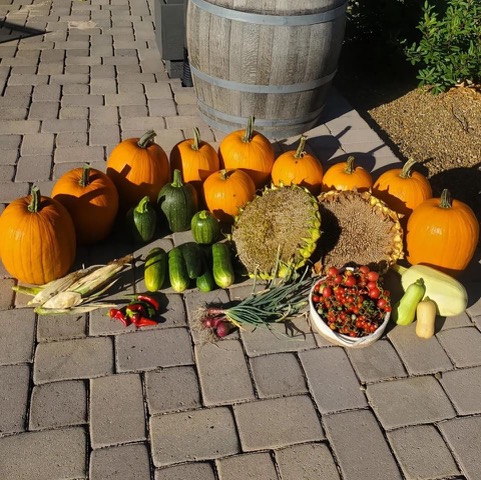
By Michelle DiMuzio, Communications Coordinator
The pandemic exposed the deep disparities and inefficiencies in our food system, leaving communities food insecure. When Gwen Garcelon, a regenerative strategies consultant, saw food insecurity spiking in her own community, she knew backyard gardens needed to be part of the local food effort. This sparked the creation of a program Gwen had been envisioning, knowing this was the right time to take action.
 The idea was simple — partner with the local University Extension Master Gardeners to create a one-on-one garden mentoring program with aspiring backyard gardeners. The Extension Program, started in 1862, provides agricultural education and assistance to communities through state universities. During World War One, a victory garden movement was rolled out through the Extension network. Americans were encouraged to produce their own food, planting vegetable gardens in their backyards, churchyards, city parks, and playgrounds. Currently, almost all Extension offices have master gardener programs to create certified skilled gardeners (who have volunteer hours to fulfill as part of the certification).
The idea was simple — partner with the local University Extension Master Gardeners to create a one-on-one garden mentoring program with aspiring backyard gardeners. The Extension Program, started in 1862, provides agricultural education and assistance to communities through state universities. During World War One, a victory garden movement was rolled out through the Extension network. Americans were encouraged to produce their own food, planting vegetable gardens in their backyards, churchyards, city parks, and playgrounds. Currently, almost all Extension offices have master gardener programs to create certified skilled gardeners (who have volunteer hours to fulfill as part of the certification).
The project allows Master Gardeners to use their volunteer hours to provide support to backyard gardeners and create productive food gardens, step-by-step. The key to the success of the program is the mentorship component, as it pairs experts with novices, ensuring their gardens are productive from the start. “If you set new gardeners up for success, and stay with them through the ups and downs, the results can be astounding — that’s why the one-on-one mentoring is so critical,” explained Gwen.
Molly Beverly, Slow Food Prescott chair, chef, writer, and food activist, learned about Gwen’s initiatives during a food systems webinar and started her own version of the program – Grow Food In Your Backyard (GFIYB). Local Master Gardeners and aspiring garden beginners were encouraged to submit applications in the spring of 2021. The program launched with 20 successful gardens, which impacted church and school communities, families, children, and veterans, with 100 percent of participants responding they would be continuing their gardens the following year. It has since gained enthusiasm and momentum and is currently beginning its second season; this year, the program received 26 mentor applicants and 35 garden applicants. The enrollees included three school gardens, two indigenous tribes, one teen center, one church garden, one LGBTQIA+ run organization, as well as veterans, families, and children.
 Beyond the food production, Molly and Gwen have witnessed the multi-faceted benefits of the program. “Local food systems are a regenerative strategy because they have cascading benefits,” shared Gwen. “They bring people together and build a culture of sharing, which we desperately need in our communities in order to hold our social fabric together with the increasing challenges and mental health issues of our time.”
Beyond the food production, Molly and Gwen have witnessed the multi-faceted benefits of the program. “Local food systems are a regenerative strategy because they have cascading benefits,” shared Gwen. “They bring people together and build a culture of sharing, which we desperately need in our communities in order to hold our social fabric together with the increasing challenges and mental health issues of our time.”
As the gardens blossomed, the environmental benefits also shined. “Gardens have the ability to create microclimates,” Gwen emphasized. “If a neighborhood were to take all its yards and turn them into gardens, the neighborhood would be cooler, have greater water retention and carbon sequestration, and you’d see the return of native pollinators. The neighborhood benefits environmentally as well as socially. We need to stop watering lawns and just start watering gardens.”
In alignment with the good, clean and fair food for all values of Slow Food, Molly and Slow Food Prescott ensured this initiative spread beyond people’s backyards. In partnering with schools, churches, and local Indigenous communities, the positive benefits of the GFIYB program were felt by a plethora of community members. “People don’t really understand what it takes to grow food; they stick a seed in the ground and think delicious food will just pop out,” Molly shared. “People are enchanted when they find out how interesting and challenging gardening is. They maybe never really looked at soil before, and the children bloom around it — it’s like a whole world opens up around them. There is a lot of enthusiasm and energy around it.”
“When you work that hard to grow the food, you’re also way less likely to waste it,” Gwen added. She shared that currently 40% of the food produced and purchased in the U.S. ends up in our landfills.
 The dream for the program is to have every Extension office in the country adopt this model and create a second victory garden movement. “We’ve seen that this can work in any climate and any community, as long as it has the support of the master gardeners, the mentorship program component, and a dedicated program organizer,” Gwen explained. With this movement, Gwen envisions societal benefits beyond food. “Regeneration is mainly about repairing our relationship with the land. Every garden does that in the most fundamental way — even just getting our hands dirty in the soil repairs our gut biome. Honoring the land and our relationship with it is central, and necessary, to make the shift we are being called to make as human beings.”
The dream for the program is to have every Extension office in the country adopt this model and create a second victory garden movement. “We’ve seen that this can work in any climate and any community, as long as it has the support of the master gardeners, the mentorship program component, and a dedicated program organizer,” Gwen explained. With this movement, Gwen envisions societal benefits beyond food. “Regeneration is mainly about repairing our relationship with the land. Every garden does that in the most fundamental way — even just getting our hands dirty in the soil repairs our gut biome. Honoring the land and our relationship with it is central, and necessary, to make the shift we are being called to make as human beings.”
Interested in starting a backyard garden program in your local community? Gwen and Molly are eager to help! Reach out to Slow Food USA at comms@slowfoodusa.org and we will connect you with Gwen and Molly.

